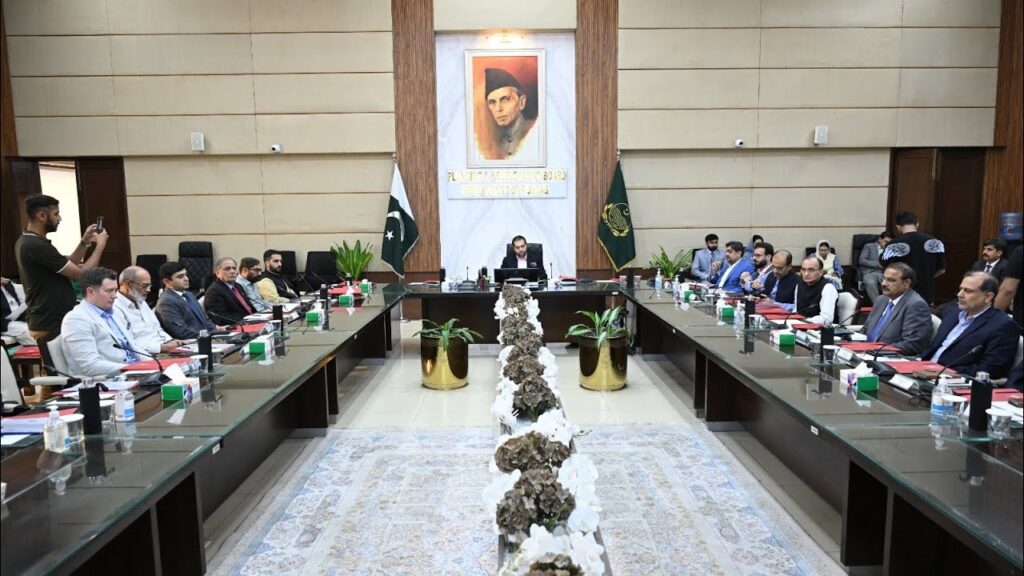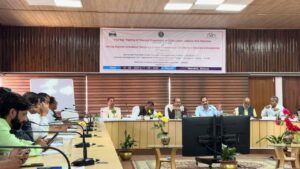
The Government of Punjab, in collaboration with the Ministry of Climate Change & Environmental Coordination (MoCC&EC), the Asian Disaster Preparedness Center (ADPC), and the World Bank, officially launched the District Adaptation Plan (DAP) of Dera Ghazi Khan under the Climate Adaptation and Resilience (CARE) for South Asia Project.
This initiative, based on the principles of climate justice, aims to address the district’s unique vulnerabilities and enhance its resilience against climate-induced hazards such as floods, heat waves, and droughts.
Dera Ghazi Khan, located in a semi-arid region prone to extreme weather events and flash floods, faces significant climate-related challenges. The DAP (2025–2030) provides a comprehensive, transformative strategy for managing water resources, reducing disaster risks, promoting climate-smart agriculture, and strengthening public health infrastructure. It also paves the way for climate finance investments through public-private partnerships and innovative mechanisms such as carbon markets.
The launch event held at 𝗔𝗞𝗦 𝗔𝘂𝗱𝗶𝘁𝗼𝗿𝗶𝘂𝗺, 𝗣𝗹𝗮𝗻𝗻𝗶𝗻𝗴 𝗮𝗻𝗱 𝗗𝗲𝘃𝗲𝗹𝗼𝗽𝗺𝗲𝗻𝘁 𝗕𝗼𝗮𝗿𝗱, 𝗣𝘂𝗻𝗷𝗮𝗯, brought together key stakeholders from government agencies, international organizations, donors, civil society, and local communities.
Members Provincial Assembly from Dera Ghazi Khan Salah Uddin Khosa, M.Ahmad Khan Laghari, Usman Leghari, SMBR, Punjab Nabeel Javed, Regional Head adpc Lt General R Nadeem Ahmed, Secretary Environment Raja Jhangir Anwar, Secretary Industries Omer Masud, British High Commission Head of Lahore Ben Warrington, DG PDMA Ali Khan, Chief Environment Saba Asghar, Project Implementation Officer, Shokat Shafi Project Management Executive ADPC Sana Zulfiqar and other Notable participants included representatives from the World Bank, Asian Development Bank (ADB), UN agencies, and local academia participated in the ceremony.
Minister of Agriculture Punjab Syed Ashiq Hussain Kirmani presided over the session as the Chief Guest. In his address, he emphasized the significance of the DAP in strengthening climate resilience across the province. “The District Adaptation Plan of Dera Ghazi Khan is a vital step in protecting our communities and infrastructure from climate-related risks. By leveraging local knowledge and scientific expertise, we aim to ensure sustainable development and build a climate-resilient future,” he stated. He pledged to establish a standardized framework for crafting District Adaptation Plans for Punjab’s most climate-vulnerable districts. On behalf of the Punjab Government, he committed to implementing this plan and ensuring its integration into broader development agendas—backed by robust financial and technical resources and underpinned by principles of transparency and accountability. The success of this initiative will hinge on inclusive and participatory processes, strong institutional coordination, and the active engagement of local communities, civil society, and the private sector.
Lt. Gen. Nadeem Ahmed of ADPC echoed these sentiments, highlighting the collaborative nature of the initiative. “This plan exemplifies the power of collaboration in addressing climate change. It reflects a data-driven and community-centric approach to building resilience and securing a sustainable future for Dera Ghazi Khan,” he remarked.
On behalf of the Ministry of Climate Change & Environmental Coordination, Joint Secretary Ms. Khalida Bashir stated, “The DAP of Dera Ghazi Khan stands as a model of localized climate planning aligned with national climate priorities. It represents the Ministry’s commitment to supporting provincial and district-level adaptation efforts through capacity building, policy alignment, and interagency coordination.”
A representative from the World Bank, Bilal Khalid, reaffirmed the organization’s support for climate adaptation in South Asia. “It’s a privilege to support the Government of Punjab in launching this strategic plan for Dera Ghazi Khan. It is an important milestone under the CARE project and reflects the World Bank’s dedication to fostering inclusive, climate-resilient development pathways that leave no one behind,” he noted.
The DAP’s key objectives include strengthening stakeholder collaboration for effective implementation, mobilizing resources and partnerships for technical and financial support, and developing an action plan for monitoring, evaluation, and learning (ME&L) to ensure sustainable and impactful execution. Expected outcomes encompass enhanced stakeholder ownership and institutional support, the establishment of collaborative frameworks for securing climate finance, and a structured ME&L framework for long-term success.
source



